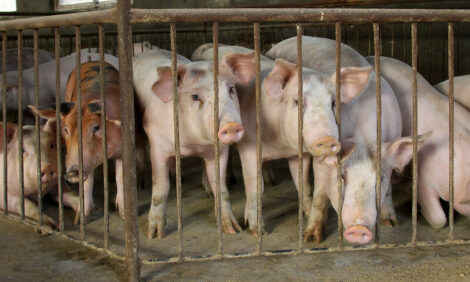



Exporting Pig Trotters Could Swing Brexit Pendulum in UK Farmers Favour
UK - Tapping into the lucrative multi-million pound global pig trotters market could be a saving grace for UK agriculture post-Brexit, writes Chris McCullough.If Defra was to reach agreement with countries like China and allow UK processors to export a higher percentage of an animal’s carcass then farmers could benefit financially.
During a meeting of the Agri-Food Strategy Board in Northern Ireland, Brexit was described as a pendulum which could swing either as an opportunity or a threat.
However, Declan Billington, the chairman of the Northern Ireland Food and Drink Association, and managing director of Northern Ireland’s largest animal feed firm John Thompson & Sons Ltd, said it was up to agri leaders in Northern Ireland to influence those leading Brexit negotiations in London.
Delegates at the meeting were told that local farmers and those in the rest of the UK don’t realise the velocity of which Brexit could hit their businesses once in force.
Declan told the agri-food reps the industry had to pull together in order for meaningful negotiations to take place.
Declan said: “Brexit is the only show in town and we must embrace it. Going forward is what we must do and do so with a game plan.
“Our agri-food industry in Northern Ireland turns over £4.6billion annually and we trade £708m with the Republic of Ireland.
“Another £440m is sent to the rest of the European Union and £140m sent to the rest of the world. This means a whopping 28 percent of our turnover could be subject to trading tariffs once Brexit is in force.
“If we have tariffs imposed on our produce this would potentially create massive food inflation which could see cheese prices rise by 58 percent and milk prices rise by 30 percent. Consumers would not be impressed with that at all.
“The UK market is in deficit as we export a total of £18billion yet import £39billion meaning a deficit of £21billion. How can that be? Surely we can redress that balance.”
“Thanks to the important trading we do with the Republic of Ireland which puts money into London, Northern Ireland has a strong advantage when it comes to negotiating for our agri-food industry with the London negotiators.
“However, I have a grave concern and that regards the people put in post over there to negotiate the UK’s exit from the EU.
“Their knowledge of agriculture both locally and internationally is very poor. However, we have a chance to influence their decisions and now is the time to act on that,” he said.
The chairman of the Agriculture and Horticulture Development Board in England Peter Kendall said Northern Ireland was in a “super position” to negotiate Brexit.
“Even though it is the UK as an entirety that must negotiate Brexit, once the doors have been opened each country within the UK can identify its own niche food groups to international customers.
“Northern Ireland is in a super position to do that with the importance of its trading with the Republic of Ireland.
“We all must learn from the best exporting countries. For now we need to unite and influence to make a better future,” he added.
“Pigs trotters are currently classed as waste and cannot be exported because Defra has not reached agreement with some of the big users of pigs trotters such as China.
“The Germans and the Dutch already export pigs trotters to China which is proving to be a lucrative deal as it means a higher percentage of the animal is saleable.
“Yet the UK government says it cannot authorise such exports. In Northern Ireland and in the rest of the UK this means we are losing a lot of trade because of that one product, but there are many others just as valuable.”
Tony O’Neill, chair of the Agri-Food Strategy Board called for unity to deliver a strong message to the Brexit negotiating table.
He said: “We must all sign up to the Northern Ireland Food and Drink Association to have input into discussions.
“With a single strong voice we can get our message across much more easily to our own advantage. It will be a challenge to speak with one voice but we must do it for the sale of our industry and the 43,000 jobs supported by the agri-food industry in Northern Ireland.”






